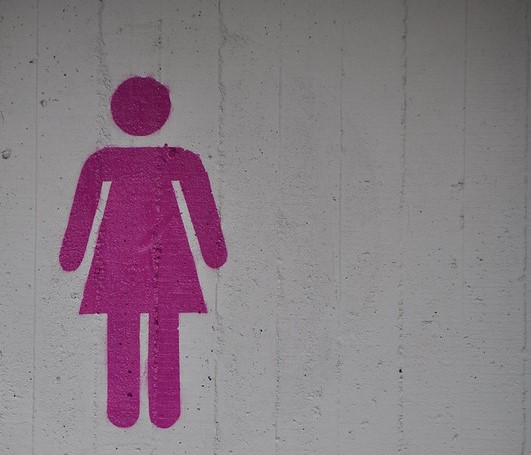My first period came when I was 11 years old. I remember feeling emotionally erratic days before, with sadness and irritability that wouldn’t relent. My periods were extremely heavy and painful for years; I remember being bound to my bed for up to a week incapacitated in pain. I never felt a worse physical pain in my life. I would throw up at school, and often feel like I was going to pass out. I’ve had to call my mom on several occasions from school because I needed to be picked up.
A common condition in the US, endometriosis (called endo for short), is when endometrial tissue (tissue that normally lines the inside of the uterus) is found growing outside of the uterus, or on other surrounding organs, such as the ovaries, fallopian tubes or even the bowel. Endo is a condition passed on genetically, causing extremely painful periods, heavy bleeding and sometimes infertility in people with uteruses. The excess endometrial tissue must be expelled even if it’s outside the uterus, which is why uterine cramping in people with endo can be severe.
My mother and maternal grandmother were both endo sufferers, which put me and my sisters at high risk for inheriting the condition. My mom understood what kind of pain I was in. She suspected that something could be wrong when month after month I would demonstrate these symptoms: periods so painful that it caused vomiting, being emotionally erratic and heavy bleeding that gave me an iron deficiency. She decided that enough was enough after I had been getting my period for a few years. Around age 14, I landed in an OB/GYN office for the very first time.
After my first appointment and describing my symptoms, my doctor diagnosed me with Premenstrual Dysphoric Disorder (PMDD). PMDD is a severe form of PMS (Premenstrual Syndrome) that requires a medical diagnosis and is often treated with hormone pills or birth control pills. Hormones responsible for causing a period every month in people with PMDD often disrupt neurotransmitters in the brain, causing feelings of sadness, depression, anger and irritability. I started taking a pill every day to prevent my painful periods and the emotional rollercoaster that comes with it every single month. I haven’t really had a problem with my period ever since I’ve been on the pill.
I just turned 21 a few months ago, which means that I was due for my first annual pap smear and pelvic exam, both important exams to ensure sexual and reproductive health, as well as detect any cervical cancers. My OB/GYN, who I have been seeing regularly, offered a judgment-free environment during a particularly and notoriously invasive physical exam, as well as frank discussions of sexual history and activity.
I fervently believe that everyone should be offered the experience that I had with my doctor. No one should have to feel embarrassed or ashamed of their bodies, their symptoms or their sexual history, when dealing with endometriosis or otherwise.
Growing up a girl, I vividly remember looking in the mirror and hating what I saw. I didn’t look like all the other girls in movies and on TV of which I grew up watching. Puberty only made it worse. Body dysmorphia is common despite how debilitating it is. I didn’t want to talk to my doctor about hating my own body out of fear of judgment or embarrassment; it was only recently that I found a therapist that I feel comfortable expressing these feelings with. I don’t think there’s a worse feeling than dealing with suspected judgment from a medical professional.
Many people neglect maintaining their sexual and reproductive health due to suspected judgment from doctors, especially women and people with female reproductive systems. As a society, we teach children, especially young girls, to be ashamed of their bodies and how they look. It’s long been time to flip this narrative and teach children about their bodies.
Using anatomically correct language is just the tip of the iceberg; the fact that Republican Rep. Stan McClain introduced a bill in Florida that would ban discussions of periods for elementary school children is extremely misogynistic and sickening to hear. If I hadn’t gotten the period talk before my first one, I would have been both embarrassed and horrified at the fact that I was bleeding; something that’s totally normal for all members of the female sex.
All doctors, especially ones that deal with women’s issues and female-sex related issues on a daily basis, must recognize this: the number of sexual partners a woman has should not make her a “slut,” nor an accidental pregnancy or STI. We all know well that there is a clear double standard for how many sexual partners is considered acceptable based on your gender. If you use protection every time, it should not matter what a person’s body count is; plain and simple.
Additionally, the bodily autonomy of women and nonbinary people must be recognized. This connects to the idea that doctors will not tie a woman’s tubes if they’re under a certain age. Even in Massachusetts, where doctors claim to be liberal and gender inclusive, they will hesitate to offer a woman permanent birth control if they have no children. It is absurd that in the country where some states have bans on abortion or restrictions on birth control and where forced childbirth and motherhood is seen as acceptable and even expected, doctors will not accept a woman’s choice to not become a mother.
Doctors and people in the medical field have a certain shared responsibility to make their patients comfortable, regardless of gender or sex. The medical system needs to do better for all of us.
Olivia Cushman can be reached at [email protected].




















